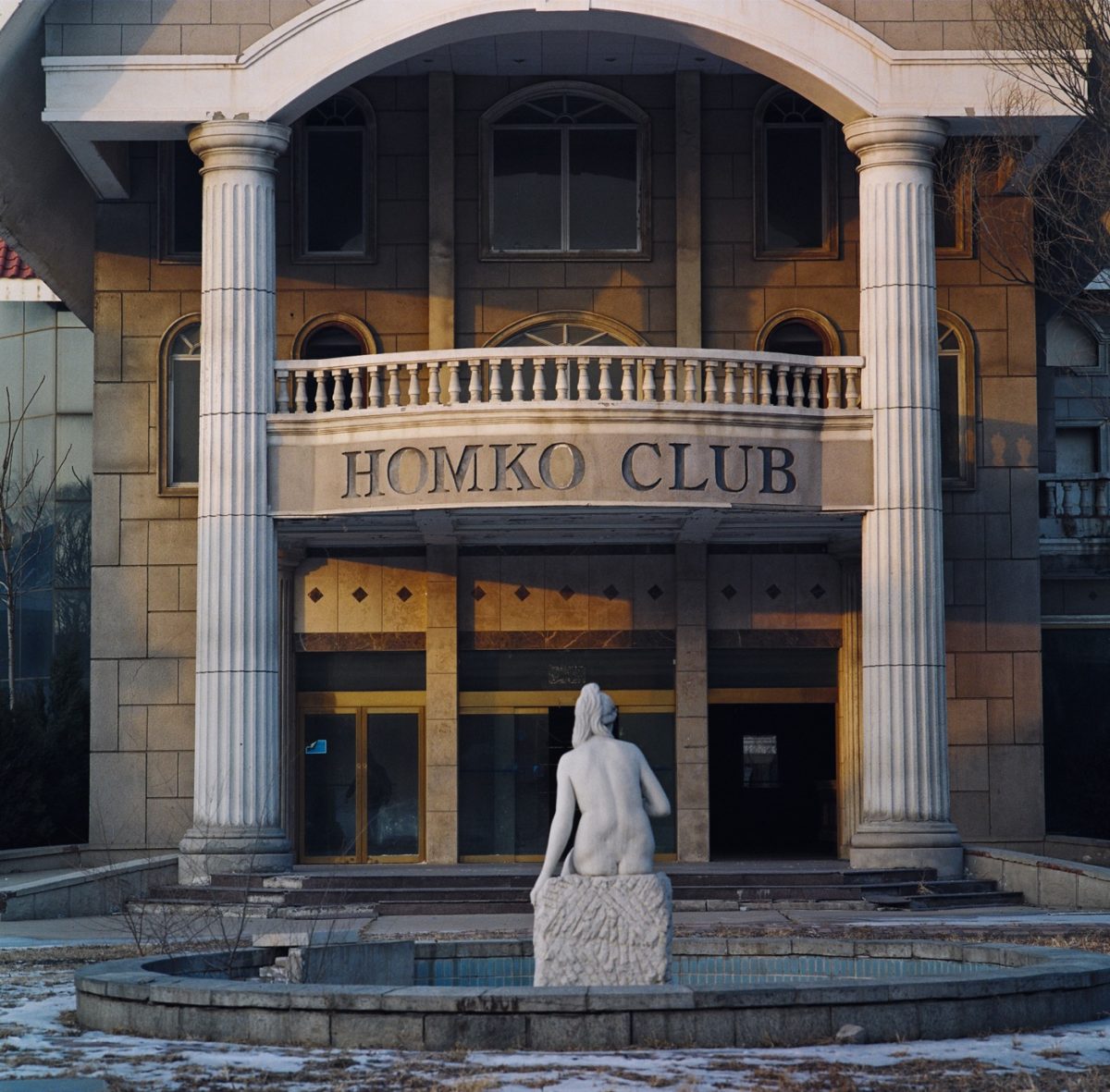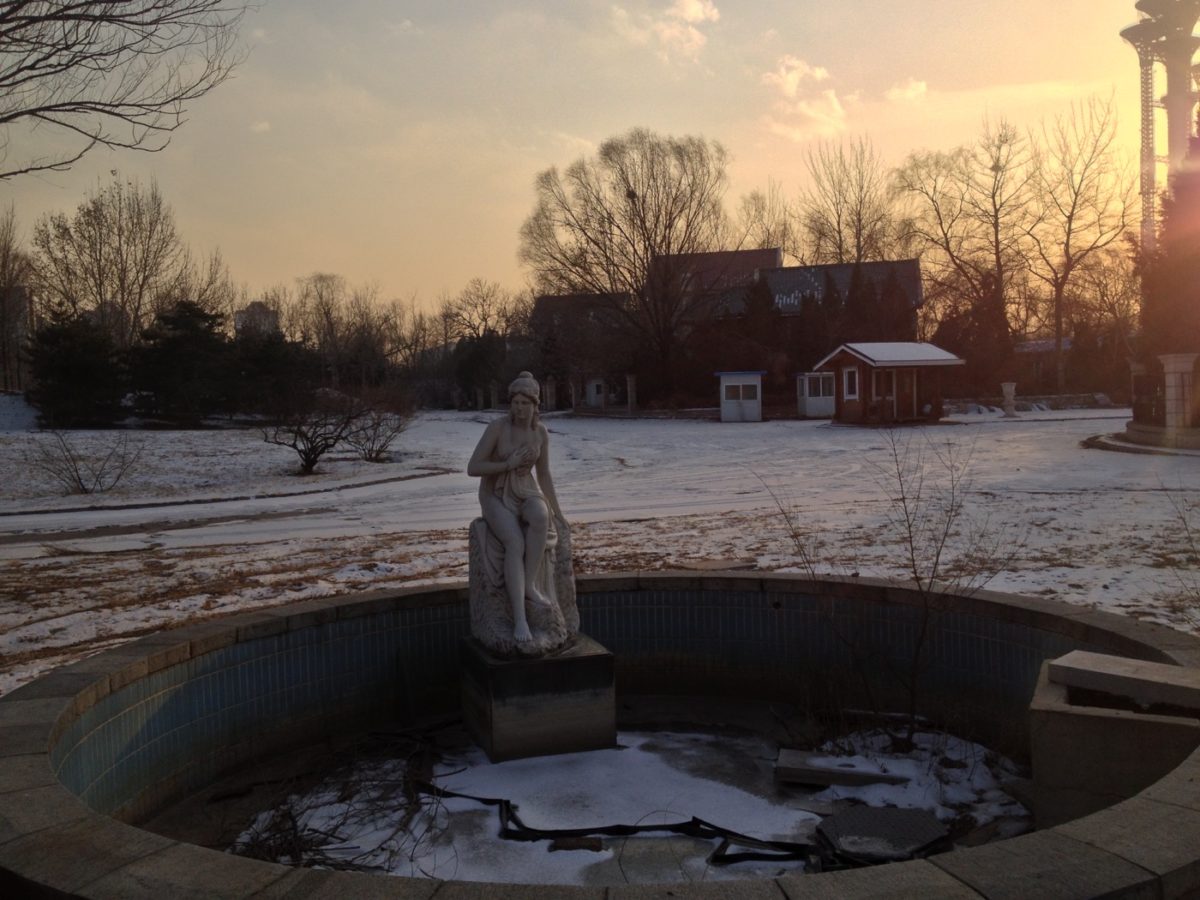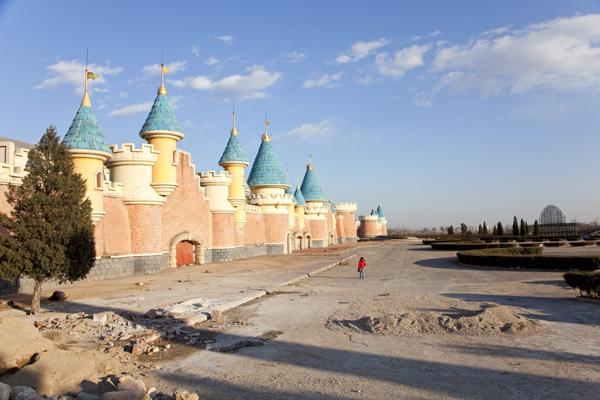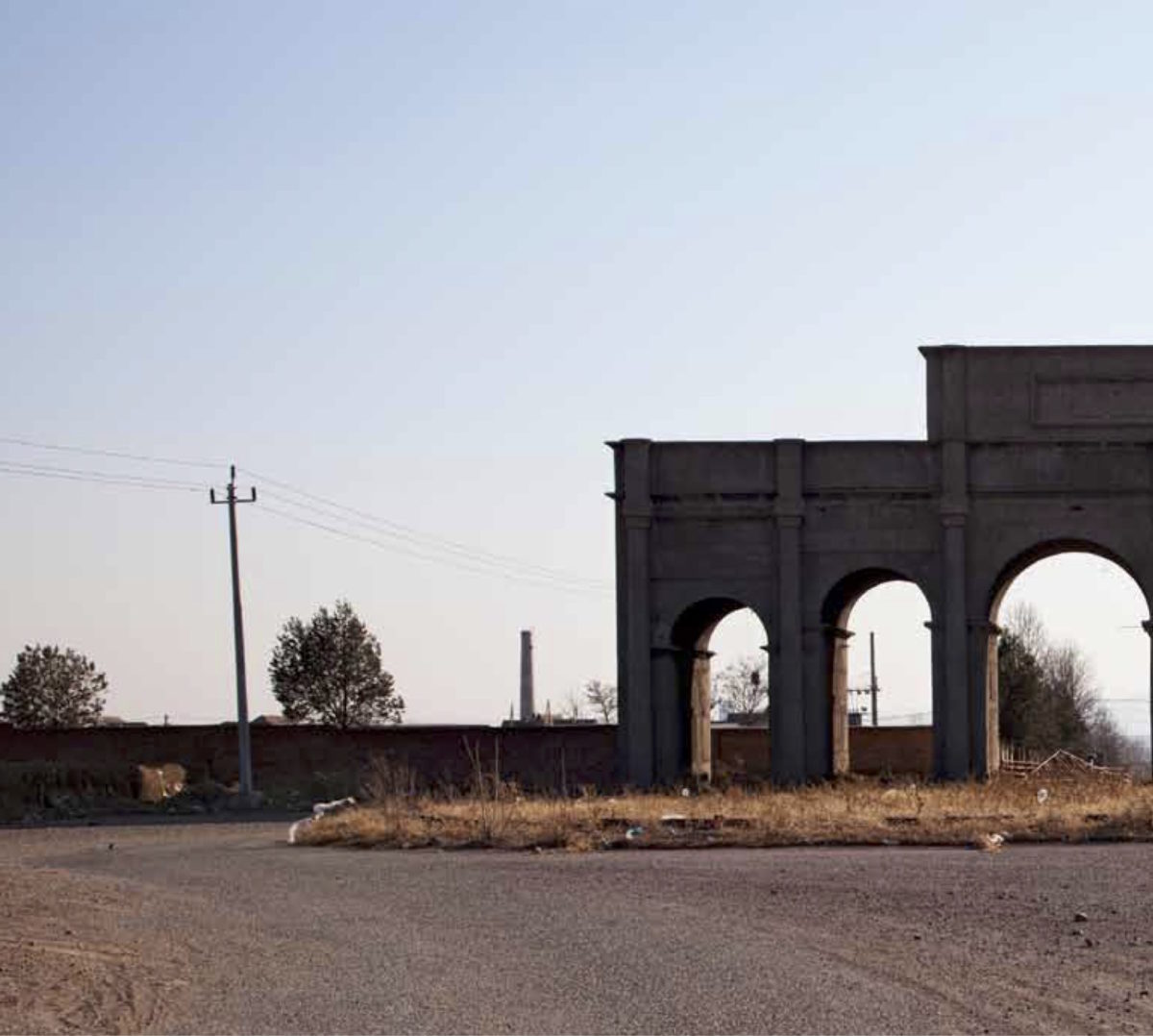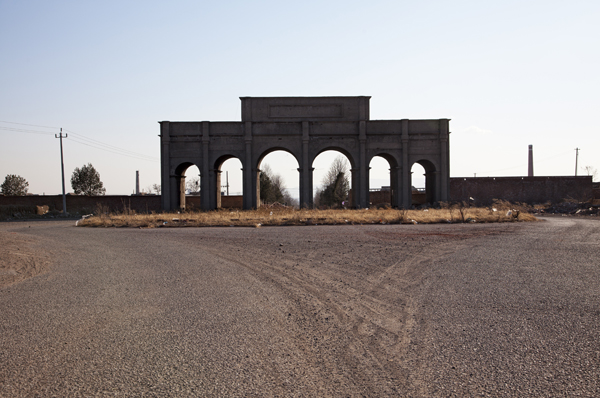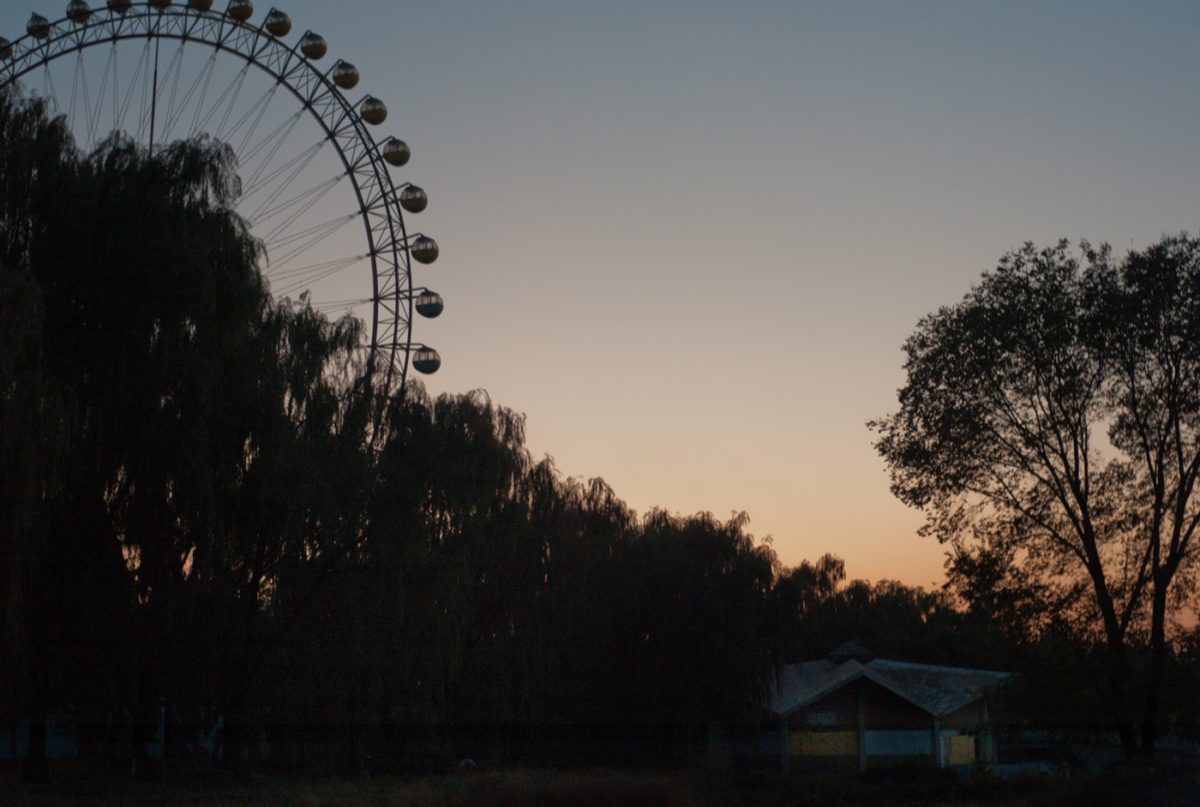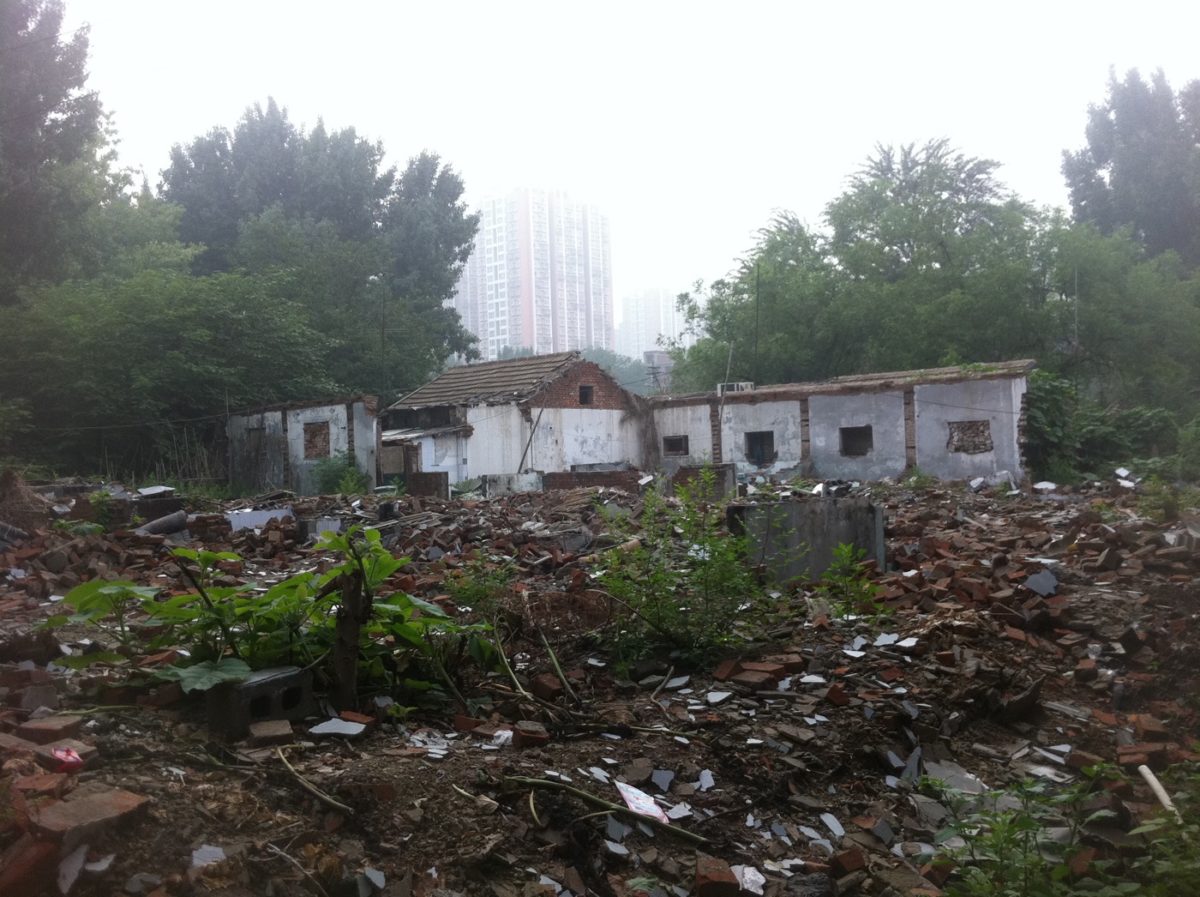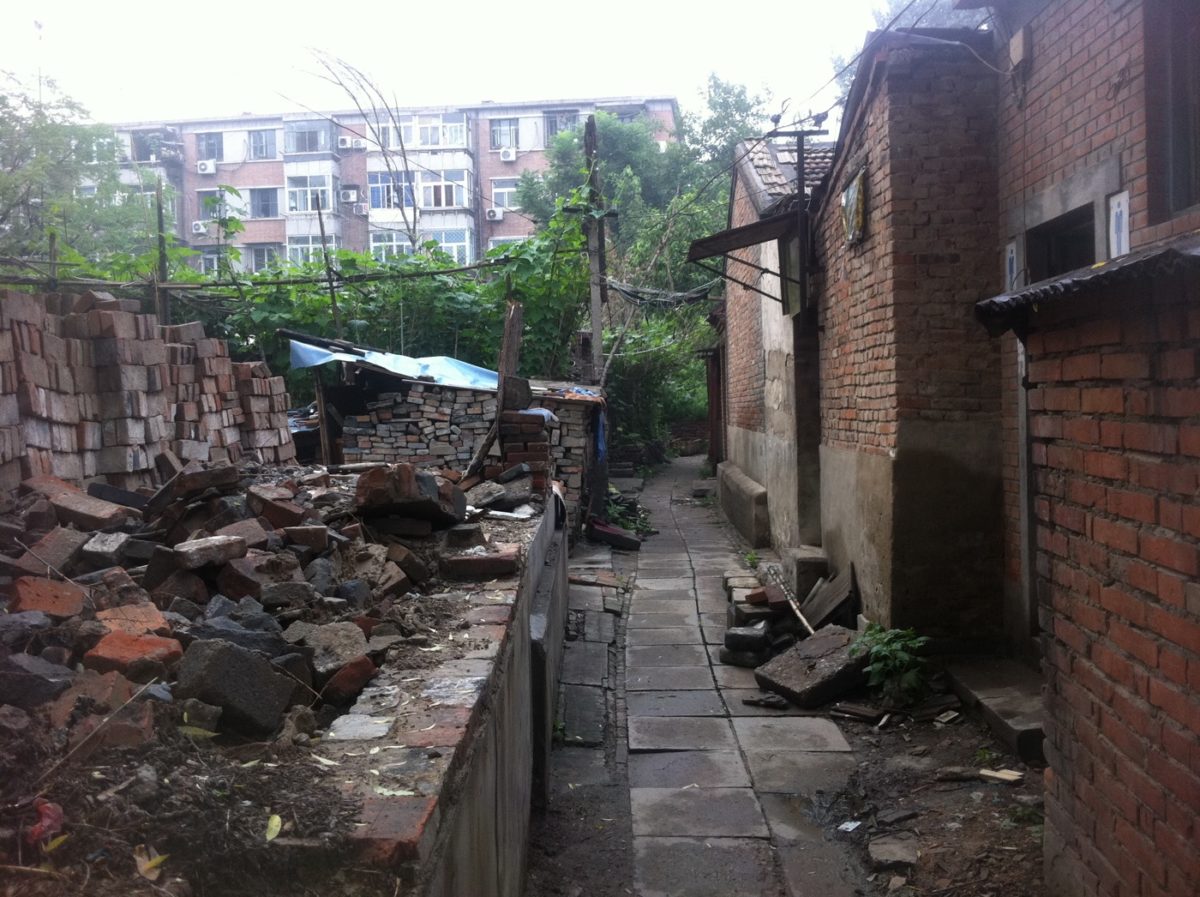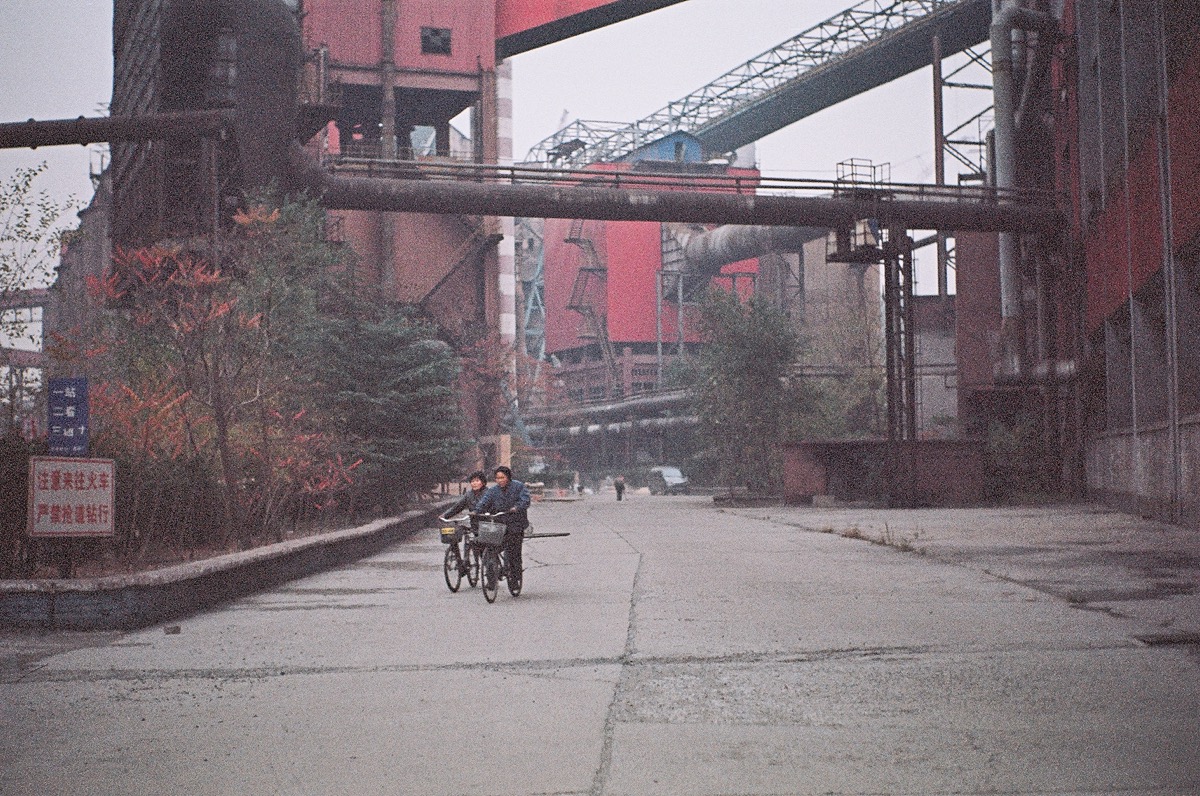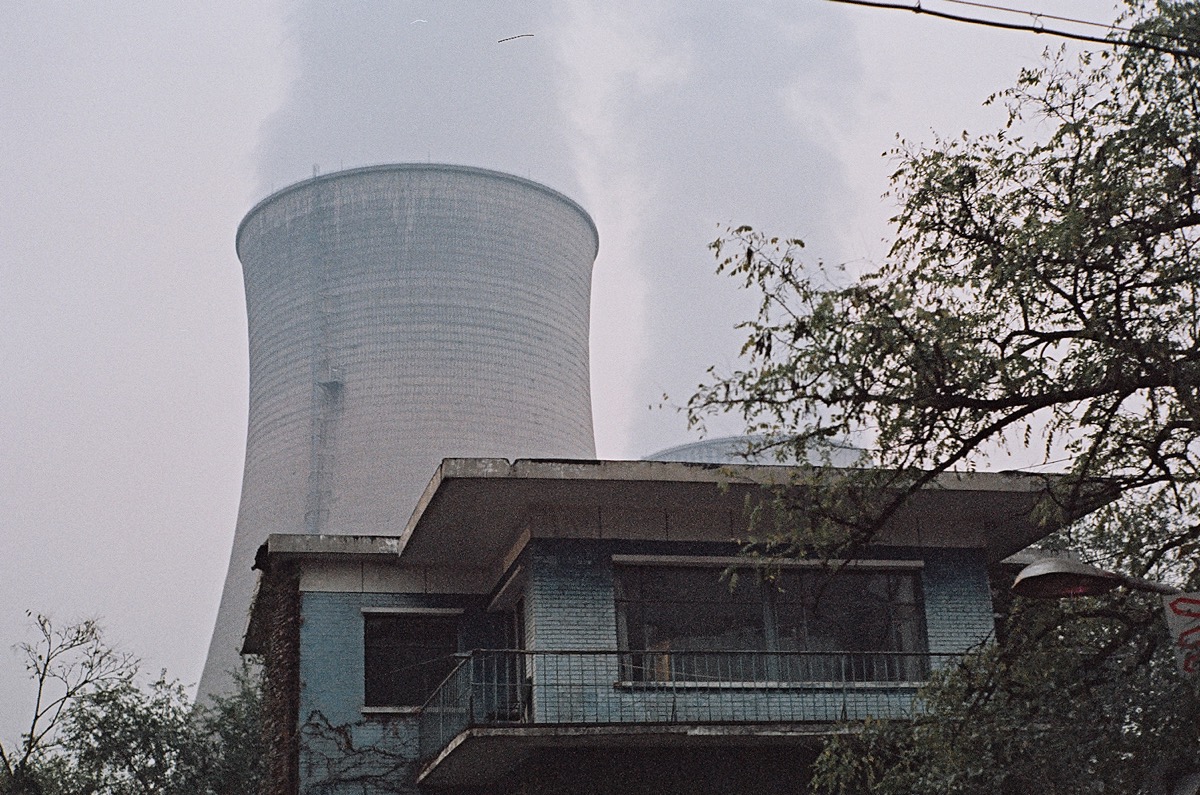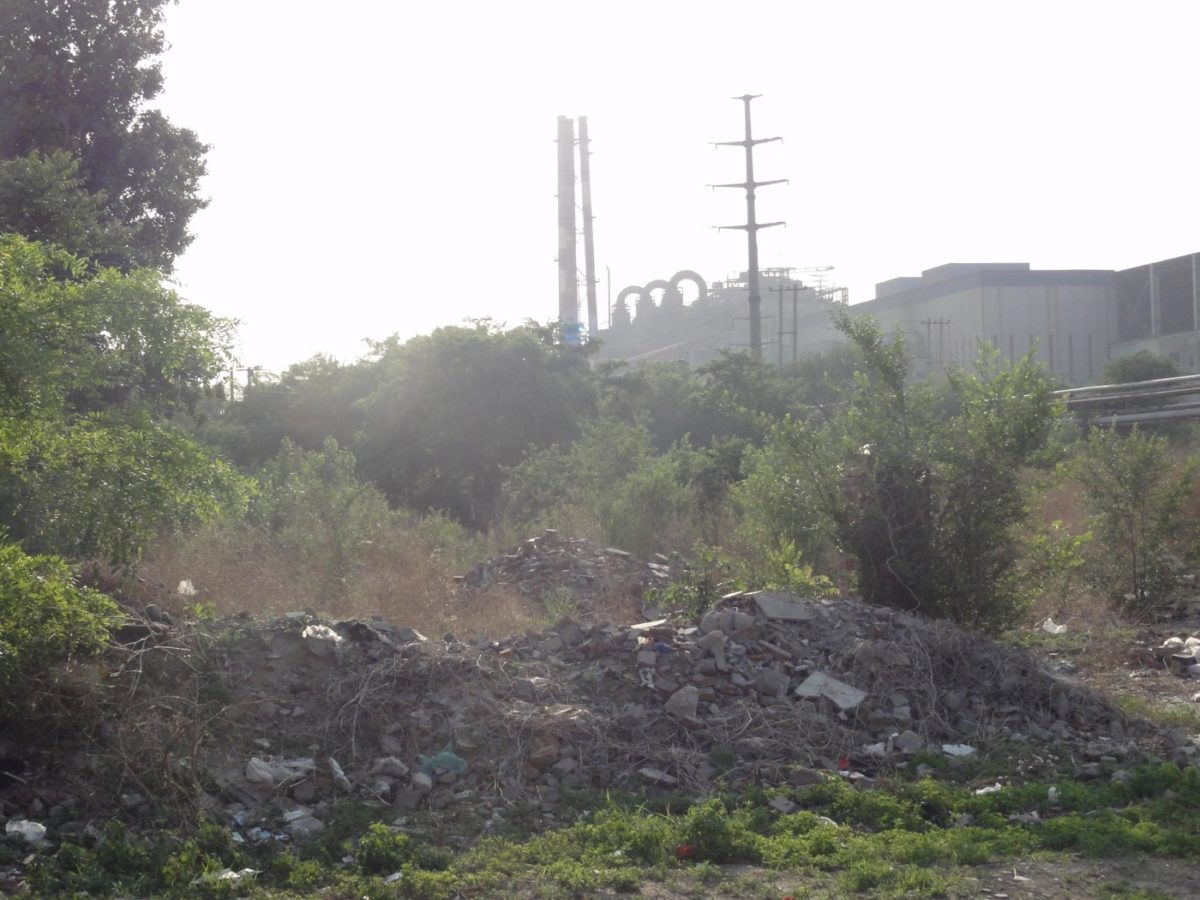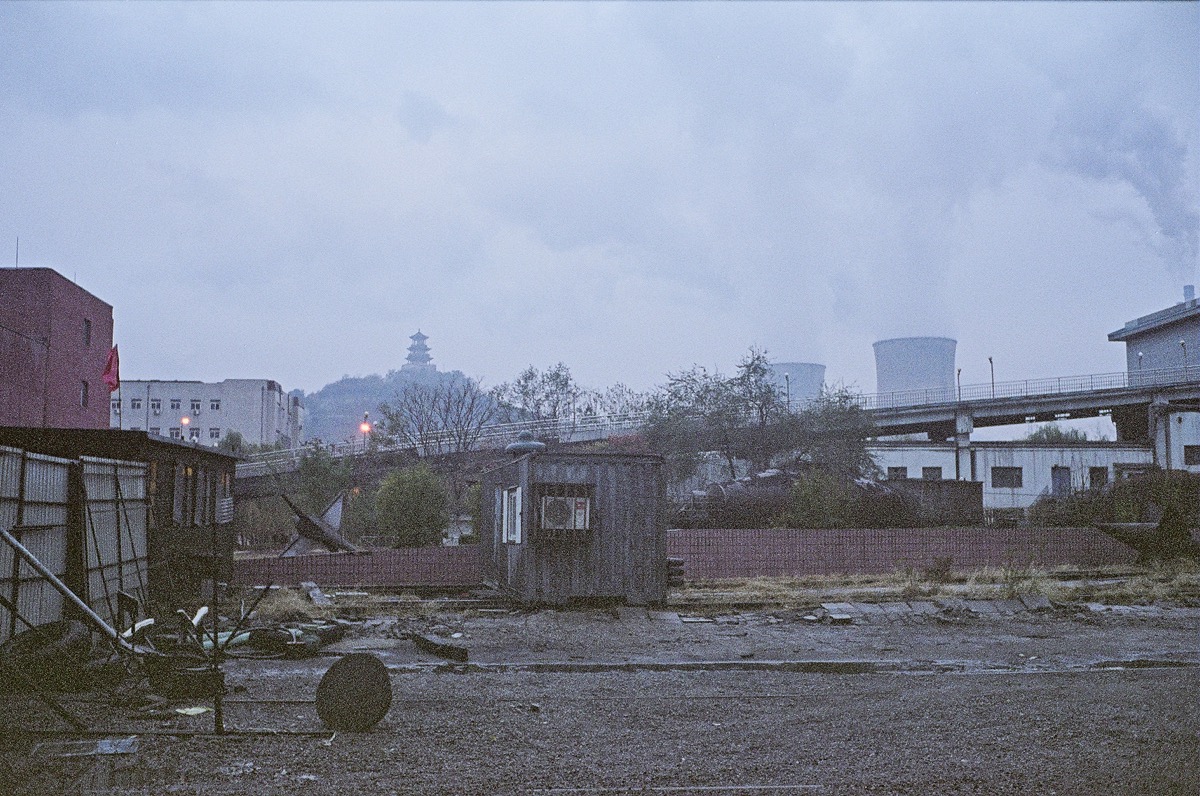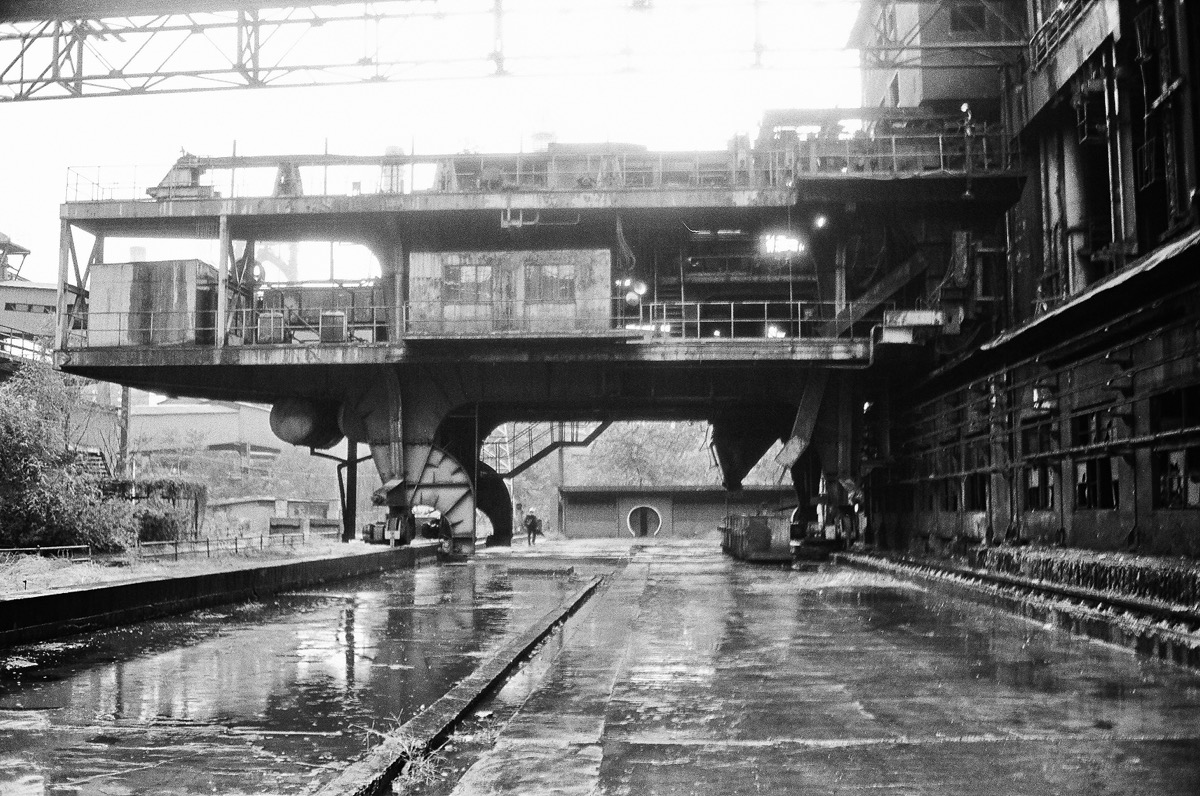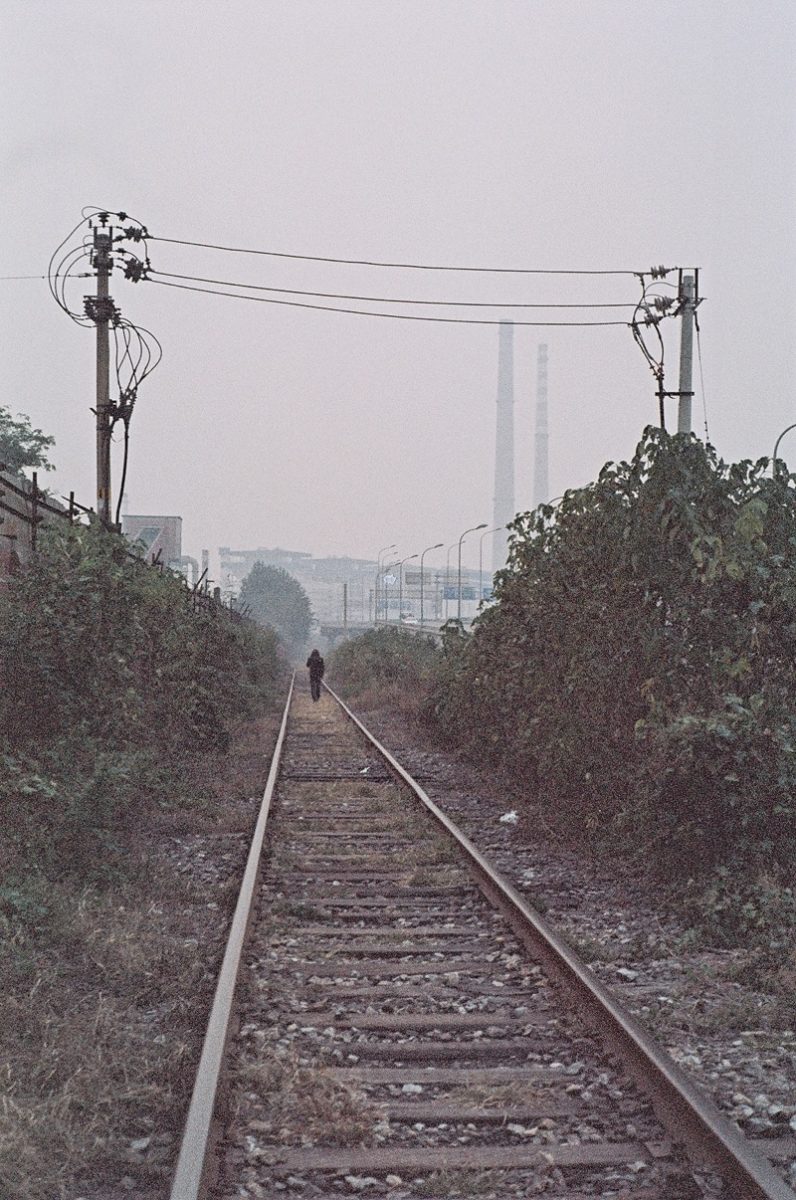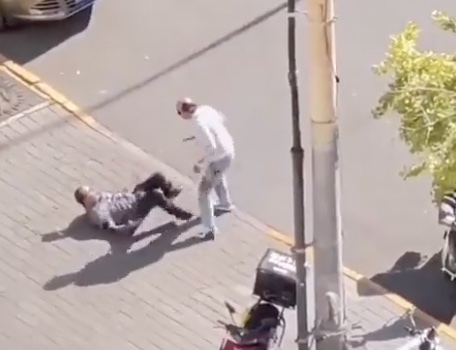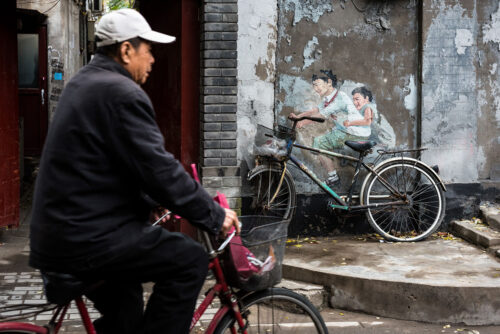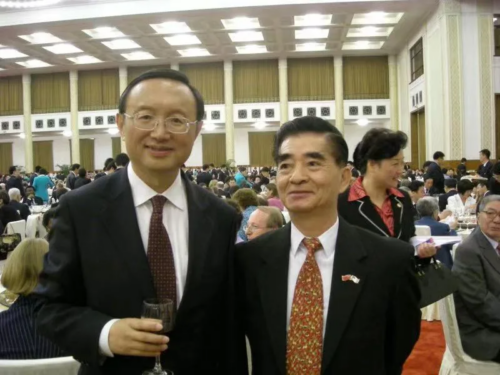Lost in Beijing: Forgotten wastelands of China’s capital
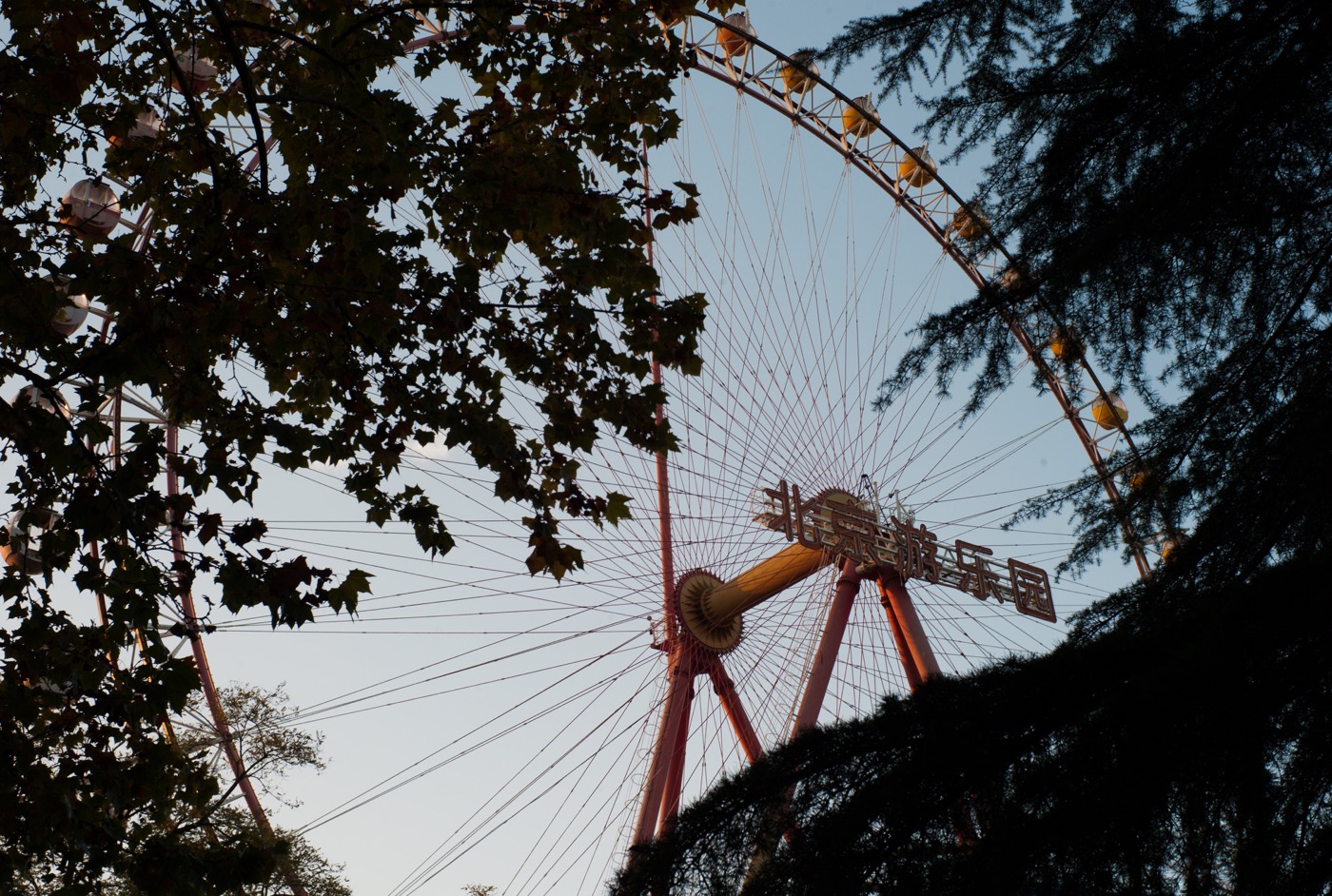
Beijing is a shiny metropolis, but below the gleaming skyscrapers and busy thoroughfares are desolate amusement parks and abandoned neighborhoods, remnants of a different place, reminders of a recently forgotten past.
Another version of this story appeared on Danwei.com on January 25, 2013 under the headline “Wastelands of Beijing.”
The Homko Club had everything a wealthy Chinese businessman could want. Inside a gated compound, the Grecian-style members’ club offered residents a chance to unwind in exclusive comfort, with a fully equipped gym, swimming pool with jacuzzi, steam rooms and sauna, bar, billiards, mahjong, massage, and — although home was literally just a stone’s throw away — the convenience of private bedrooms, in which the weary member would find succor with a personal masseuse in secluded comfort.
Despite amenities fit for an ancient emperor — or, perhaps, a mid-level provincial official — membership at the Homko remains at an all-time low of zero. In the 25-meter swimming pool, mounds of concrete rise from the frozen surface. The bar is bereft of bottles; no sighs will ever be heard from its bedrooms, because the Homko has long been abandoned to the elements. It is as if the apocalypse had happened to the Chinese Brady Bunch.
The story of what happened here, and the dozens of grandiose houses around it, remains a mystery to this day. But now, half a decade after all life left this luxury location, perhaps the truth is beginning to emerge about a project that began over a decade ago, before the Olympics, back when borderline-hazardous air in the capital was considered normal. Housing developments were beginning to spring up on the edges of town, providing some blue-sky respite from the smoggy center. It was then that villas by the Beichen Group, a Beijing-based realtor also known as Beijing North Star, were built just north of the Summer Palace, the decadent imperial retreat where emperors of old would seek cooling retreat from the seasonal heat.
It is afterwards, though, that the story becomes unclear. The development had the bad luck to impinge on government plans to remake the surrounding area — a tangle of overgrown pastures and forest, home to only homeless and drug addicts — into the beautified area now known as the Olympic Forest Park. The expensive compound was marked for demolition, and served as the temporary offices of the park’s management, yet oddly remained standing long after.
Controversy finally blew up around the villas in December, instigated by an anonymous netizen almost as shady as the scandal he claims to have uncovered. The whole area is illegally owned by the Red Cross Society of China, according to a Weibo user calling himself Mengzi Mencius. His post spread quickly, forcing the much–beleaguered charity to issue a brief statement denying the Red Cross owned any property at the park, and adding that the allegations were being investigated. Olympic Park representatives said the villas lack any property deeds and are currently under their management.
“Now the Red Cross is hiring its own people to investigate itself, there’s probably never gonna be a way to find out [the truth],” scoffed Mencius, who claims to be CEO of a dating website called 7SOYO. Specializing in exposing corruption in the charity sector, Mencius is one of a growing number of “people’s supervisionary activists,” citizen journalists who interpret Xi Jinping’s reformist rhetoric as an anti-corruption call to arms.
But Mencius reckons the case is murkier and more dangerous than at first suggested. “Even you [foreign media] won’t dare to investigate it,” he warned in an email interview. The Red Cross uses the same accountancy firm as Faye Wong’s Smile Angel Foundation charity. Zhongwei, a two-room, seven-employee outfit in Tuanjiehu, is an usually small accounting operation, considering the amounts of money involved with both organizations. “To protect my source,” Mencius said, “I can’t release more proof, [but if the Red Cross investigation] differs from the facts, I’ll be providing more materials until the truth comes out.”
However, he adds, the story goes further than the mere quotidian misuse of public funds: “The water is deep and there are bigger parties involved.”
★
It is a common-enough tale here — wealth and corruption, demolition, and development — yet one far from the usual reports of flashy skyscrapers, foreign architects, and five-star hotels. There are dozens of similar premises in the capital, some iconic, others embryonic, where industry and interest has retreated, and only broken China Dreams remain. The landscape of Beijing is littered with areas that once hummed with activity but now stand desolate.
Most familiar to many, perhaps, was Wonderland, on the outskirts of northeast Beijing and still visible from the Badaling Expressway. This was a proposed 100-acre “Luxury Brand Outlet Mall and Eco-Resort,” under former Beijing mayor Chen Xitong 陈希同, that was supposed to attract tourists in the millions and generate billions in annual revenue for Huabin 华彬 (a.k.a. the Reignwood Group) and its investors. All that was built, however, was some colorful fairytale facades, rusty signs, and a giant concrete castle whose graying edifice seems to echo Neuschwanstein’s dreamlike spires more evocatively than even the Magic Kingdom at Shanghai Disneyland. For years, this doomed tower looked over only mud and corn, its land long since re-appropriated by farmers. And then it was demolished.
Just up the road from it is another Chen pipe dream, the Oriental City That Never Sleeps 东方不夜城 (dōngfāng búyèchéng), a curious collection of ancient Greek-style Doric columns and archways, surrounded by empty concrete houses and a half-finished amphitheater. Spread across 250 mu (about 41 acres) of farmland, this was to have been the bulkhead of a massive, luxury gambling resort for the newly emerging super-rich of China in the early 1990s. Cycling past these ruins, though, local resident Old Liu is scornful of what remains of the phantom project. “It was big news at the time,” he says. “Clearly, they wanted a place for eating, drinking, playing, and having fun…and who cares if it was legal? Today, if you have money, you’re king.”
This particular king fell from his throne rather prematurely, however.
Both Wonderland and the City went down with former Beijing mayor Chen Xitong 陈希同, who, in the 1990s, spearheaded what became the capital’s signature real estate: vast, usually empty, “luxury” malls. Chen steamrollered many of these projects through, often with flagrant violations of building codes, such as the infamous 1994 forced eviction of McDonald’s flagship restaurant from its 20-year lease in Wangfujing. That literally paved the way for Chen’s own flagship project, the controversial Oriental Plaza. Recklessly dismissing objections from city planners and officials, including then-Prime Minister Li Peng 李鹏, Chen’s profiteering overstepped the hidden mark. His receipt of $37 million in kickbacks — from a Hong Kong consortium led by the (aptly named) Li Ka-shing — for allowing the demolition of neighborhoods on prime real estate would become the corruption scandal of the decade. In 1998, Chen was sentenced to 16 years for graft, his associates jailed, and his legacy disgraced (not that any incoming official continues his predecessor’s vanity projects, anyway).
“Who would deny that in such a huge project, the developer had some connections with the leaders who were in charge,” shrugs Mr. Li, a peddler who says he works nearby. “After [Chen’s] ‘stepping down,’ it’s natural that this project had to stop.”
Mrs. Feng, who lives just outside the gates of the building site, told me the project was started in 1991, but abruptly ceased development in 1993. She believes that the developer ran out of money after finishing another tourism project — the “Miniature Theme Park of Old Beijing” — that flopped. “It was rumored that all the residents around [the City] will be relocated, after they’d been well paid,” she says. “But all these years later, we’re still living here.”
Despite a doomed attempt to revive Wonderland by cashing in on the growing Olympics fever in 2005, this and similar Chen projects, like the so-called “Romance Park of the Heart” in Yuquanlu (now demolished, sadly, but forever preserved in full, crumbling, weed-strewn glory here), remain never-never lands. The deals that created them are long defunct, yet the half-finished buildings remarkably linger on, potent reminders of the continuous confluence of corruption and construction, the vagaries of power, the hubris of politicians — or simply the grand delusion of imagining a giant theme park on land that’s frozen much of the year.
With the oversight of the local government, the land where the doomed casino project stands has been bought back from the bank, which had reclaimed it as collateral, and sold to the Beijing City University. They apparently plan to build a new campus there, though there has been no sign of construction for months. When it eventually comes, though, the renovation will most likely be swift. Mrs Feng has been waiting for that day for a long time: “I’m happy: the days spent living next to this ghost city will soon be over.”
★
Once upon a time, it had been somewhere to go. The Beijing Amusement Park 北京游乐园 (Běijīng yóulèyuán) was a first for the capital, an attraction sufficient to lure around 2.4 million visitors a year, with rides such as Splash Mountain, a “4D cinema,” rollercoaster, and pedal boat. Today, it’s just another desolate — and slightly dangerous — relic of the old city, a reminder of the recently forgotten past that lies just below the flashy surface.
Where thousands of families once swarmed, now only a 12-year-old boy called Ding roams free. The son of a local caretaker, he spends his afternoons prowling a domain 750 mu across, which once included a lake (now filled), bridges (barred with steel plates), restaurants and concession stands (boarded-up and empty), and a mountain (dismantled), toward a place known as the Magic Road (wreathed in dirty shrouds, it’s long since lost any magic).
Ding appeared to my photographer and me at an awkward moment: while we were negotiating a way into the sealed-off park via a route scoped out on a previous recce. We were on all fours over someone’s tin roof when we heard the sound of footsteps; when it turned out to be a boy, grinning, with a knife up his sleeve, everyone relaxed.
The park’s 150 workers were laid off years ago, but far from being completely deserted, the place was soon taken over by an “abandonment economy”: security guards, sweepers and groundskeepers, who all ceaselessly patrol the grounds (though the only people wanting to get in seem to be us). “I get chased by angry cleaning women all the time,” the boy, who is adept at dodging them, tells us.
When the amusement park shut down for good, it wasn’t just the staff that felt the pain, though. While those without skills faced an uncertain future they hadn’t anticipated, locals who saw the park as a pivotal part of their childhoods were confronted with the fleeting nature of the past in China.
“Don’t take away our memories,” pleaded messages scrawled on the gates after they closed; these wistful farewells were soon painted over, but visitors who forlornly loitered outside the shuttered park in 2010 were keen to express their sense of loss and confusion. “There are less and less genuine old Beijing things,” one office worker told China Daily in an extensive eulogy to the 23-year-old park. She felt lost in the modern city: “Beijing is getting further and further away from the city of my childhood memories.”
Ding, too, is prone to sentiment. Initially boastful (“I used to come here all the time with my friends and break windows…look at my knife, I’m training to be a ninja”), he grew sober as the sun drew down on the Ferris wheel, now rusted permanently still. “Actually, when I think I about it, it makes me feel sad. This place used to be so full of life.”
A joint Sino-Japanese venture whose luck ran out once the zestier Happy Valley opened in 2006, the park’s business affairs are still being unraveled. The land remains in the hands of the Chongwen district government, who apparently has grand plans for a new kind of entertainment complex for a new generation, this time with bowling, arcades, themed restaurants, and 34 cinema screens. Wealthy comedian Zhao Benshan 赵本山 and former NBA player Yao Ming 姚明 are among those whose names are being floated around as key investors.
In the good old days before bowling alleys, flowerbeds greeted visitors with bright purple blooms — a color traditionally associated with prosperity and wealth. Since that dried up, the guards have put them to more practical use: cabbages replace the posies. There’s a kind of strange beauty to the ruins, at least. “It’s not safe here,” one middle-aged security guard scolds us. He agrees to show us around, with one proviso: “Just tell [the other guards] you’re my friends, otherwise I’ll get fined!”
Standing next to the keeled-over remains of a Santa Claus, he said his appreciation for the landscape of Beijing Amusement Park still runs high. “The lake is wonderful,” he enthuses. It’s now mostly filled with rocks and debris, with a few half-sunken boats among the stagnant lilies, yet the guard is impressed. “It’s beautiful to take pictures with the ducks here,” he says.
A quartet of wildfowl wheel over the marshy waters as the sun sets on. At the park’s edge, a train rattles by the rusting remains of the rollercoaster, giving the brief illusion of movement among its skeleton structure, silhouetted in the twilight. Far away, beyond the outskirts, headlights glimpsed rushing across the Second Ring Road show a city unconcerned, busy going about its nightly business. But inside the empty amusement park, all is serene.
The abandoned park still offers one last pleasure for those who make it inside: an illusion of peace, in memoriam for a footnote of history soon to be forever forgotten.
★
As any city grows outward, so it also shrinks inward. In new Beijing, the narrow hutong alleyways lined with single-storied courtyard houses, many dating back generations and often holding up to four or five families apiece, became 25-floor towers and Soviet-style housing compounds; many are already starting to decay.
Before there was Sanlitun’s The Village complex, there was simply “the village,” a rural collection of suburban farming communities three kilometers from Dongzhimen (hence 三里屯 , or “three-li village”). The area was chosen by Zhou Enlai 周恩来 to become the capital’s new embassy district in the 1950s; the first bar opened in 1985. Those who worked the land there have long since been made to move, leaving homes behind to be razed and the land “developed” like hundreds of thousands since. Some hold out against progress, refusing to budge until their needs — usually over the value of the ancestral land — are considered. Those who stand their ground often wake up to find their “nail houses” being bulldozed anyway; others become notorious irritants. Some succeed.
The village of Guangheli 广和里 is therefore an unlikely outlier. Surrounded on all sides by rearing tenement blocks, what’s left of it is more a partially demolished hamlet in downtown Jinsong, overrun with neglect. Feral cats roost on huge piles of rubble, chickens strut and peck at rubbish between half-destroyed walls, and the ruined walls of homes long-since relinquished stand waiting for the developments. Ancient tombstones, allegedly remnants of an old Qing cemetery, lie rather appropriately broken up into slabs of granite. The area used to be home to one of Beijing’s biggest markets, Dongdan, and although vendors do a quick street trade less than a minute away, Guangheli itself is deathly quiet, bar the occasional territorial yapping of someone’s dog. A door opens and suddenly out peers a wrinkled and curious face — people still live here in the shadow of the wrecking ball, with the surrounding residential towers to constantly remind them of the inevitable.
One such holdout is Pan Zhenliang. He doesn’t seem your typical “nail,” though perhaps that’s exactly what he is. The cheerful septuagenarian — who keeps pigeons as well as a huge and feisty Dalmatian — could be the epitome of the one old man who isn’t going to take it anymore and doesn’t care what you think about that. The big dog gets shepherded into a side room after we accept his invitation to tea. What follows is a pragmatic tale on the dynamics of demolition.
“All this was once full of farmers, growing vegetables and living quite poorly in communes,” Pan said about the time the local government began building new housing. At first, this wasn’t a problem. The original communes were not well built and their crowded living space meant privacy was an unheard-of luxury; after the state began developing the land, lives improved. “But then it developed into an industry…the city expanded and the old part was gone.”
Pan’s situation is as old as the Property Law — he’s not happy with his current level of compensation, which currently amounts to 600,000 yuan for 200 square meters, or four new houses in the suburbs. Pan knows what he wants: he’s holding out for a pair of two-bedroom apartments for he and his wife (“facing south, like this”) and two three-bedroom apartments for this daughter’s investment. His neighbors, he said, were not so well-off as he and so were glad to accept their initial offer. Nails typically consider themselves different. “As far as I’m concerned, I’m not from a dirt-poor family, I’m not homeless, nor do I have any problem with my current house,” he reasoned. “I ain’t leaving unless there’s a sweet deal, and if the demolition team comes — I’m 70 years old, what am I afraid of?”
Judging from his neighbors’ laundry lines, with their telltale fifties’ fashion, the only nails left in Guangheli are just like him, old enough not to take anything lying down, too old to care whether anyone does.
“[Thugs hired by developers] chucked bricks across my wall a few years ago and the police were called,” Pan recalled. His situation, he said, proves that the government is on his side: “Demolitions are covered all over the media; reporting on it has become totally official now.”
In Pan’s much-decorated, much-cluttered sitting room, the only other sound is the soft cooing of his pigeons, which he’s proud to say are specially imported, and the bark of the Dalmatian, who’s excited to be free again. But the roar of the bulldozers, he knows, grows ever closer as a reality. Guangheli is one of the last of its kind, a real, traditional village in Beijing that’s still standing — just about — inside the ring roads. Its survival may be an anomaly and it painfully shows; the impending eradication is perhaps now the best thing for everybody. Although the long battle has made Pan obdurate and philosophical, saying, “I’m prepared for the worst,” he may not have to be.
★
Development in modern China can show little regard for leisure concerns and, often, none at all for residential ones. Even the engine of the economy, its industry, is beholden to higher concerns.
Travel to the farthest station on Line 1 of the Beijing subway, Pingguoyuan 苹果园 in Shijingshan 石景山 District, and step out onto a busy Beijing boulevard of flatbed trucks, lorries, and cars. Nothing to see here but a desolate suburb with little of remark, except a hulking ghost from the industrial past looming on the westernmost stretch of Chang’an Boulevard, the axis that separates Tiananmen Square from the Forbidden City. This is the former location of Shougang Company Ltd., a pig-iron plant originally founded in 1919. It became the largest steel mill in the country, sprawling from the suburbs over 8.56 square kilometers, the size of 2.7 Summer Palaces, two central business districts, and three Financial Streets, according to Shougang Daily; the site even had its own newspaper. At its peak in the 1990s, it had an annual output of 10 million tons and offered “iron rice bowls” to more than 200,000 workers.
A contented worker never wanted for anything in Shougang. The plant had its own apartment complexes, dining halls, schools, hospitals, public bathhouses, cinemas, even a newspaper — Shougang Daily, which regaled readers with stories of steel output in its triumphalist headlines; on the last day of production at the old plant, the paper published a special commemorative edition: “Steel was as important as food in newborn China,” ran the nostalgic front page. For many years indeed, Shougang’s steel fed the capital’s economy, and virtually the entire district that surrounded the factory. “The mill had everything,” a 52-year-old former employee told Global Times. “We wouldn’t leave for months at a time.”
Guan Xiaomeng, 29, grew up there. “My fondest memory was the canteens,” she recalls. “Because I was about 10 or 12 when I was there, I especially liked the ice creams. That canteen used to sell its own brand of ice cream, just called ‘Shougang Ice Cream,’ which couldn’t be bought anywhere else. Growing up there was generally pretty sweet. It felt a bit like living in the sort of traditional courtyard that you see on TV.”
By the late 20th century, though, the Shougang plant was losing its luster: local residents were less willing to put up with constant, virulent pollution and all-pervading soot. In 2001, when Beijing was awarded the hosting rights for the 29th Olympic Games, these rising public concerns emerged in serious questions about pollution, quality of life, and water usage (the mill required 50 million cubic meters of water annually to run). A reputation as an industrial center was no longer something to be proud of. Now that the Party had invited a global sports circus to witness its coming-out, Shougang was a guest that had overstayed its welcome.
Two years after an Olympics closing ceremony seen by a billion people, a very different kind of closure was taking place in Shougang: the final stage of its departure to the islet of Caofeidian 曹妃甸 in Hebei. Toasts were raised and officials speechified, the ceremony observed by a select group of former workers and state media.
Nearly three years later, the former factory giant is slowly disintegrating behind large padlocked fences and guarded gates. Inside, among blackened stacks, are disused Soviet-style apartment blocks, a decaying workers’ hospital, an overgrown warren of gloomy tunnels, railroads, and rolling stock, all rusting into oblivion.
Wandering through this industrial necropolis, it seems as though some unknown event caused the residents to vanish overnight. Rattling pipes, wrapped in cloth, still billow steam, while yellow helmets, heavy-duty gloves, industrial face masks, welding gear, boots, and ubiquitous noodle packets lie as if their owners just dropped them and fled.
At other times, though, there’s a startling reminder that this place still sustains life. In a deserted mill, a man in long johns strides confidently past clutching a toothbrush; he saunters into a disused bathroom without a backward glance. A gleaming bicycle rests in one open hallway, a crack of electric light visible under the door. A pensioner takes an evening stroll through the shuttered factories. Then there are sights that just seem bizarre: a phalanx of huge wild plants, resembling Triffids, block a road beside a lawn as neatly trimmed as a bowling green.
Now Shougang’s future is with the local government, which hopes to turn it into a “Central Recreational District” that will somehow honor its past glories. Nearly 30 reporters were taken to the factory before the 18th Party Congress in November and told of plans to turn the area into a factory of a very different kind, cranking out animation, telecommunications, and arts in place of steel and soot.
Taking a cue from art zones in Beijing and Shanghai, some of the plant’s distinctive architecture will be preserved, providing what Xinhua calls “a spot of industrial tourism.” For sure, it’s hard to imagine a better symbol of China’s changing image: a giant of the Soviet planned economy, remolded into a mechanism of soft power in the era of the free market.
Yet Shougang’s story is as much about what was left behind as what is supposed to come. The plant’s migration to Hebei in 2010 deprived 22,000 workers of a job they probably expected for life, and many found themselves cut adrift without any kind of social safety net (6,000 workers were sent to new plants, with a further 6,000 remaining to “man the facilities,” according to Global Times). Some have made their way back to scratch a living as scavengers or squatters, while others simply seem unable to escape its shadow.
One youngish-looking “black cab” driver dawdles outside the gate. A child of Shougang, like Guan he vividly remembers the factory’s dining halls, where dinner was usually noodles and steam buns. At 31, though, he seems slightly adrift; there’s not a lot of work for laid-off steel workers or their families.
Still, on the way out, there’s a queue of about a dozen workers waiting to collect box suppers from inside a corrugated building on the very outskirts of the factory’s edge. Their foreman chafes at them to hurry: there’s a bus on the way. When the cogs were still turning all over Shougang, such a scene must have been commonplace. Now, of course, it’s an unexpected rarity. And although there are plenty who might disagree, that doesn’t necessarily always have to be a bad thing. “As long as Shougang can stay in operation, unlike those Olympic facilities that aren’t in use anymore, it should be fine — however that is,” says Guan. “I’ve read many articles saying Beijing has huge potential for the development of its ‘cultural industry.’ Now that the central government is promoting it, you can either call this industry ‘soft power’ — or more simply, ‘what’s profitable.’”
★
Photography by Tony Lo and Noemi Cassanelli. Additional reporting by Valentina Luo.
More from Robert Foyle Hunwick:
